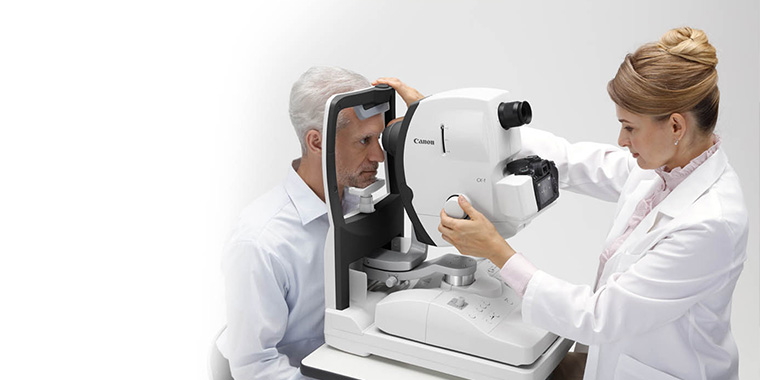Is Refractive Surgery Right for You? Factors to Consider for Better Eyecare
In the world of eye treatment, the choice to go through refractive surgery is a substantial one that demands thoughtful consideration. As individuals seek quality and freedom from the restrictions of corrective lenses, numerous factors enter play when determining the suitability of such a procedure. From the complexities of one's ocular wellness to the complexities of personal expectations and day-to-day routines, each element holds relevance in the more comprehensive landscape of refractive surgical procedure candidacy. By evaluating these crucial elements with treatment and accuracy, a more clear path in the direction of educated decision-making emerges.
Eye Wellness Examination
When thinking about refractive surgery, a detailed eye wellness examination is vital to assess the viability of the procedure for every person. eye center andalusia. This assessment includes a series of examinations and examinations performed by an eye care expert to determine the overall wellness of the eyes, the visibility of any kind of underlying conditions, and the stability of the refractive error
Throughout the analysis, numerous elements are taken into account, such as the patient's case history, current eye prescription, corneal thickness, pupil dimension, and tear movie quality. These evaluations assist to identify any kind of contraindications to refractive surgery, such as corneal problems, cataracts, or untreated eye infections. Furthermore, the analysis assists to take care of client expectations regarding the possible results of the surgical procedure based on their distinct eye attributes.
Inevitably, the eye health and wellness evaluation is essential in ensuring the safety and performance of refractive surgery, as it supplies important understandings right into the individual's eye wellness condition and helps figure out the most ideal therapy options for accomplishing ideal visual results. (eye center andalusia)
Way Of Living Assessment
A comprehensive way of living analysis is essential in identifying the viability of refractive surgery for a person's visual adjustment demands. Way of life aspects such as line of work, leisure activities, and daily activities play a crucial role in the decision-making process pertaining to refractive surgical procedure. As an example, individuals with careers that entail a high degree of physical task or exposure to environmental aspects might have various aesthetic needs compared to those with sedentary desk tasks. Recognizing just how a person's way of living may influence their vision post-surgery is important for taking care of assumptions and making sure optimum end results.
In addition, way of life routines such as sporting activities engagement, outside activities, or also skin care regimens can affect the recovery procedure and overall success of refractive surgical procedure. As an example, people that participate in get in touch with sports might require to take added safety measures to secure their eyes throughout the recuperation duration. Furthermore, people with comprehensive sun direct exposure may need additional post-operative like avoid problems. By performing a comprehensive way of life analysis, eye care specialists can tailor their recommendations and therapy plans to satisfy the one-of-a-kind demands of each patient, inevitably bring about improved aesthetic outcomes and contentment.
Expectation Alignment

Establishing practical assumptions entails complete pre-operative discussions in between the person and the eye doctor. The specialist must transparently interact the prospective risks, benefits, and constraints of the treatment (neurologist andalusia). Individuals require to comprehend that while many people achieve 20/20 vision or much better adhering to refractive surgical procedure, some may still require glasses for sure tasks like reading or driving at night. Taking care of these assumptions assists prevent frustration and website link frustration post-surgery, leading to an extra positive general experience for the person.
Risk Evaluation

Elements that might increase the danger of problems include age, certain clinical conditions like autoimmune conditions, unstable vision prescription, slim corneas, and unrealistic individual expectations. In addition, selecting a skilled and proficient doctor, adhering to pre and post-operative care guidelines carefully, and divulging any type of relevant medical background can assist mitigate threats.
To minimize the chance of problems, ophthalmologists carry out complete pre-operative analyses to identify any kind of contraindications to surgery. They also talk about the possible threats and advantages with clients throughout the appointment process. By engaging in open interaction and shared decision-making, both the individual and the eye doctor can collaborate to figure out if refractive surgical procedure is the best selection based on individual risk profiles and desired outcomes.
Consultation Value
Thinking about the essential duty of notified decision-making in examining dangers and prospective issues in refractive surgical treatment, the examination process holds significant relevance in assisting people towards ideal results. During the assessment, the eye doctor reviews the patient's eye wellness, refractive mistakes, and total suitability for surgical treatment. This preliminary assessment is essential in figuring out one of the most suitable treatment for each person, thinking about factors such as corneal density, pupil size, and existing eye conditions.
Moreover, the consultation works as a possibility for individuals to review their expectations, worries, and any kind of questions they might have regarding the surgical procedure. Clear communication between the client and the doctor is vital to make sure realistic expectations and a detailed understanding of the prospective dangers and benefits included.
In addition, the assessment permits the specialist to explain the various surgical options available, their corresponding outcomes, and the post-operative care required. This comprehensive discussion empowers clients to make knowledgeable decisions regarding their eye care, bring about much better satisfaction and results post-surgery.
Conclusion
To conclude, people taking into consideration refractive surgery must go through an extensive eye health assessment, assess their lifestyle routines, align their this expectations with possible outcomes, assess the involved threats, and focus on assessments with eye care experts. These elements play an essential duty in establishing the suitability of refractive surgical procedure for each and every individual, guaranteeing optimal end results and satisfaction with the treatment.
People thinking about refractive surgical treatment often have high assumptions regarding the outcomes, anticipating excellent vision without the requirement for glasses or get in touch with lenses. While refractive surgery can significantly enhance vision and lower dependence on visual aids, it is critical for individuals to understand that results might differ based on specific aspects such as the degree of refractive mistake, corneal thickness, and overall eye health.
By engaging in open interaction and shared decision-making, both the ophthalmologist and the person can work together to determine if refractive surgery is the appropriate selection based on individual threat profiles and preferred end results.
Thinking about the critical duty of notified decision-making in evaluating threats and potential difficulties in refractive surgery, the assessment process holds substantial value in assisting patients towards ideal outcomes. Throughout the appointment, the eye doctor examines the person's eye health, refractive errors, and general suitability for surgical procedure.